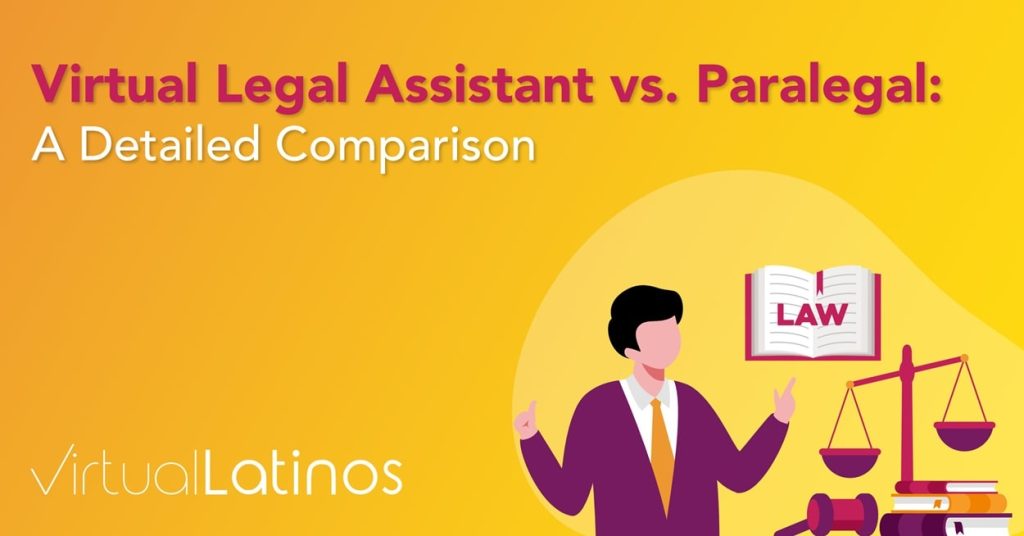Virtual legal assistants and virtual paralegal assistants differ primarily in their scope of responsibilities and legal expertise.
Virtual legal assistants are typically generalists who handle administrative tasks, document preparation, and client interactions, and may not have extensive legal training. In contrast, virtual paralegal assistants possess specialized legal knowledge, conduct legal research, assist in case preparation, and are well-versed in legal procedures. While both work remotely, virtual paralegal assistants play a more substantial role in legal matters, making them essential for complex legal support.
If you’re intrigued by the evolving landscape of legal support roles, let’s explore the emerging realm of virtual legal assistants versus paralegals.
Content
ToggleWhat is a Virtual Legal Assistant?
A virtual legal assistant, distinct from a paralegal, is a professional who aids lawyers in various administrative tasks and legal support functions. They manage paperwork, assist in legal research, maintain case records, and handle client communications, contributing to the smooth operation of legal practices.
What is a Virtual Paralegal Assistant?
A virtual paralegal assistant is a trained professional who assists lawyers in the legal field by providing substantive legal support. Their responsibilities encompass conducting legal research, drafting legal documents, organizing case files, and offering assistance during trials. Paralegals are integral to legal processes, ensuring that attorneys can focus on more complex legal tasks while they handle essential support functions.
Unique Tasks for Virtual Legal Assistants
Virtual legal assistants, due to their distinct role, often handle tasks that are tailored to administrative support, technology, and remote work.
Some unique responsibilities include:
Virtual File Management: Efficiently organizing and maintaining digital case files and legal documents in secure online platforms.
Remote Communication: Managing online client communication, scheduling virtual meetings, and ensuring secure data transmission.
Cybersecurity Oversight: Implementing and maintaining cybersecurity protocols to safeguard sensitive legal information in virtual environments.
Legal Software Proficiency: Profound knowledge of legal software and technology tools for research, document preparation, and case management.
E-Discovery Support: Assisting with electronic discovery by collecting, organizing, and analyzing digital evidence in legal cases.
Virtual Notary Services: Providing online notarization services, ensuring documents comply with virtual notarization regulations.
Remote Legal Research: Conducting comprehensive legal research using online databases and resources to support case strategies.
Digital Document Authentication: Verifying the authenticity of digital legal documents and ensuring their compliance with electronic signature laws.
Online Filing Assistance: Assisting clients and lawyers with online court filings and submissions.
Virtual Witness Coordination: Coordinating remote depositions, interviews, and testimonies for legal proceedings.
Virtual legal assistants excel in these unique tasks, leveraging technology and remote capabilities to enhance legal support in the digital age.
Unique Tasks for Virtual Paralegal Assistants
Virtual paralegal assistants, due to their specialized legal expertise, handle tasks that go beyond typical administrative support. Some unique responsibilities include:
Advanced Legal Research: Conducting in-depth legal research, including case law analysis, statute interpretation, and regulatory compliance assessments.
Case Strategy Development: Collaborating with attorneys to develop legal strategies, including case theory development and evidence analysis.
Trial Preparation: Assisting in trial preparation by organizing exhibits, witness coordination, and assisting with trial notebooks.
Specialized Legal Drafting: Drafting complex legal documents such as legal briefs, contracts, and pleadings with precision and legal acumen.
Forensic Data Analysis: Conducting forensic analysis of digital evidence, particularly in cases involving cybercrimes or digital forensics.
Expert Witness Coordination: Identifying and coordinating expert witnesses, managing their testimonies, and ensuring their availability for trials.
Regulatory Compliance: Ensuring clients’ compliance with industry-specific regulations and legal requirements, including licensing and permits.
Intellectual Property Support: Assisting in trademark, patent, and copyright matters, including research, filing, and infringement analysis.
Complex Litigation Support: Providing critical support in complex litigation cases, managing large volumes of documents, and coordinating e-discovery processes.
Legal Database Management: Overseeing legal databases for case tracking, document management, and legal knowledge organization.
Virtual paralegal assistants are well-equipped to handle these specialized tasks, contributing significantly to the legal success of law firms and legal professionals.
When considering whether to hire a virtual legal assistant or a virtual paralegal assistant, it’s essential to weigh the advantages and disadvantages of each role. This balanced perspective will help you make an informed decision that aligns with your unique needs.
Advantages of Hiring a Virtual Legal Assistant
1. Cost-Effective Support: Virtual legal assistants are often more cost-effective than paralegals. They excel in handling administrative tasks, reducing overhead costs.
2. Flexibility: Legal assistants can adapt to varying workloads and provide on-demand support, making them suitable for businesses with fluctuating needs.
3. Administrative Expertise: They bring strong administrative and organizational skills to the table, ensuring smooth day-to-day operations.
4. Client Communication: Virtual legal assistants are skilled in client interactions, enhancing customer relations and trust.
5. Versatility: They can handle a wide range of tasks, from document preparation to appointment scheduling, making them adaptable to diverse industries.
Disadvantages of Hiring a Virtual Legal Assistant
1. Limited Legal Expertise: Virtual legal assistants may lack specialized legal knowledge, making them less suitable for tasks requiring in-depth legal insight.
2. Legal Restrictions: Depending on the jurisdiction, there may be limits to the types of tasks a legal assistant can perform, which may vary from place to place.
Advantages of Hiring a Virtual Paralegal Assistant
1. Legal Proficiency: Virtual paralegal assistants are trained in legal procedures, research, and documentation, making them valuable assets for legal tasks.
2. Specialized Skills: They excel in tasks such as legal research, document drafting, and case strategy development, contributing to stronger legal cases.
3. Regulatory Compliance: Paralegals ensure that your legal documents and processes comply with industry-specific regulations and standards.
4. Long-Term Value: For ongoing or complex legal projects, virtual paralegals offer sustained legal expertise and support.
Disadvantages of Hiring a Virtual Paralegal Assistant
1. Higher Costs: Virtual paralegal assistants may come with a higher hourly rate due to their specialized legal knowledge.
2. Limited Administrative Support: While they excel in legal tasks, paralegals may not be as proficient in general administrative support.
3. Task Restrictions: Some jurisdictions have specific rules about what tasks virtual paralegals can perform, and these rules can vary.
When to Hire a Virtual Legal Assistant vs. a Virtual Paralegal Assistant
The decision to hire a legal assistant vs. paralegal depends on the specific needs and objectives of your legal practice. Here are scenarios when each role is best suited:
When to Hire a Virtual Legal Assistant:
Administrative Support: If your primary need is administrative tasks, such as document management, client communication, and scheduling, a virtual legal assistant is suitable.
Light Legal Tasks: When your workload involves minor legal support tasks that don’t require specialized legal expertise.
Cost-Efficiency: When you seek a cost-effective solution for routine administrative work that can be managed virtually.
Flexibility: If you require on-demand support for tasks that vary in intensity, a virtual legal assistant can provide flexibility.
General Practice: In a general law practice where the legal tasks are diverse and not highly specialized.
When to Hire a Virtual Paralegal:
Legal Expertise Needed: When your legal practice demands specialized legal knowledge, including legal research, document drafting, and case strategy development.
Complex Cases: In cases involving complex litigation, intellectual property, or regulatory compliance, a virtual paralegal’s expertise is invaluable.
Trial Preparation: For trial-focused practices, a virtual paralegal can assist in trial preparation, exhibit organization, and witness coordination.
Long-term Projects: When you have ongoing, long-term legal projects requiring sustained legal expertise and research.
Compliance and Regulations: In industries with stringent legal regulations and compliance requirements, a virtual paralegal ensures adherence.
Document Analysis: In cases involving forensic data analysis or intellectual property infringement, a virtual paralegal’s expertise is essential.
Choosing between a virtual legal assistant and a virtual paralegal depends on your specific legal needs and the complexity of your practice. Both roles can be valuable assets when deployed appropriately.
Education and Training Requirements
In the world of virtual legal support, the qualifications and skills of professionals are influenced by the specific demands of their roles. Here, we outline the education and training requirements for both virtual legal assistants and virtual paralegal assistants, shedding light on the qualifications that each brings to the table.
Virtual Legal Assistants
Virtual legal assistants generally require the following education and training:
High School Diploma or Equivalent: At a minimum, most virtual legal assistants possess a high school diploma or GED. This provides the foundational knowledge needed for administrative and organizational tasks.
Administrative Training: Many virtual legal assistants have completed administrative assistant training programs, which equip them with essential skills for office management, document organization, and client communication.
Experience in Legal Environment: While not always a formal requirement, experience working in a legal office or similar settings can be highly beneficial. It helps virtual legal assistants understand legal terminology and processes.
Software Proficiency: Proficiency in office software such as Microsoft Office and document management systems is crucial for document preparation and organization.
Virtual Paralegal Assistants
Virtual paralegal assistants, on the other hand, have more extensive and specialized education and training:
Paralegal Certificate or Degree: A virtual paralegal assistant typically holds a paralegal certificate or an associate’s degree in paralegal studies. This education provides a deep understanding of legal procedures, research methods, and case management.
Legal Research Training: Virtual paralegals receive training in legal research techniques, allowing them to navigate legal databases, analyze case law, and support attorneys in building strong cases.
Advanced Software Proficiency: Paralegal assistants are well-versed in legal-specific software and tools, which are essential for drafting legal documents, managing case files, and conducting e-discovery.
Continuing Education: Due to the constantly evolving legal landscape, virtual paralegal assistants often engage in ongoing education and professional development to stay current with legal trends and regulations.
Ethics and Regulations: Virtual paralegal assistants are trained in legal ethics and regulations to ensure compliance with professional standards.
FAQs Legal Assistant vs Paralegal
How can I ensure regulatory compliance when working with virtual legal or paralegal assistants?
Ensure that your virtual assistants are well-versed in U.S. legal regulations and ethics. Regularly review and monitor their work to ensure adherence to professional standards.
Can a virtual legal assistant or virtual paralegal assistant work remotely while still adhering to client confidentiality and data security standards?
Yes, both roles can work remotely while ensuring client confidentiality and data security. Implement secure communication tools and cloud-based systems to protect sensitive information.
What is the cost difference between hiring a virtual legal assistant and a virtual paralegal assistant?
Virtual legal assistants generally have a lower hourly rate due to their administrative focus, making them more cost-effective. Virtual paralegal assistants may charge more due to their specialized legal expertise.
Do virtual assistants need certifications or degrees in their field?
Virtual paralegal assistants typically hold paralegal certificates or degrees in paralegal studies. Certification and education can validate their legal expertise. Virtual legal assistants may have administrative training, which is beneficial but not always mandatory.
How do I decide which type of virtual assistant to hire for my law firm?
The decision should be based on your firm’s specific needs. If you require administrative support and cost-effectiveness, a virtual legal assistant may be suitable. For specialized legal tasks and expertise, a virtual paralegal assistant is the better choice.
How can I hire skilled virtual assistants for my law firm?
Consider partnering with professional virtual assistant services like Virtual Latinos, which offer a pool of talented virtual professionals, including legal assistants. This ensures that you find the right fit for your law firm’s needs.
Make a Smart Choice for Your Legal Practice
In the ever-evolving landscape of legal support, the choice between hiring a virtual legal assistant or a virtual paralegal assistant can significantly impact the efficiency and success of your legal practice. Both roles bring valuable skills to the table, but understanding your specific needs is key to making the right decision.
As you navigate this decision, consider partnering with Virtual Latinos. Our company provides highly skilled Latin American virtual assistants who can seamlessly integrate into your law firm. With a pool of talented professionals, we offer a diverse range of skills, including virtual legal assistants and virtual paralegal assistants.
Contact us to explore how our dedicated virtual assistants can enhance your legal operations, streamline your workload, and contribute to your professional success.









